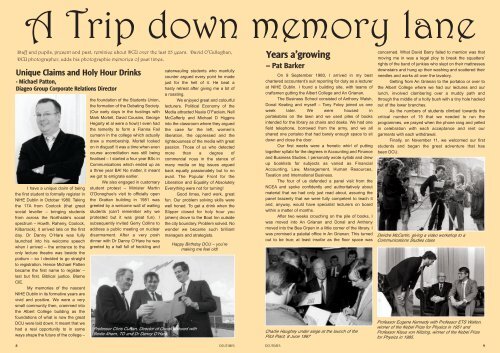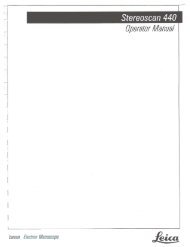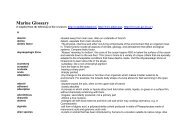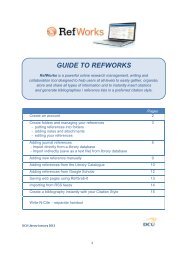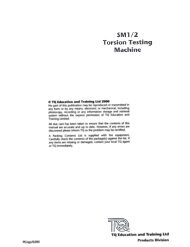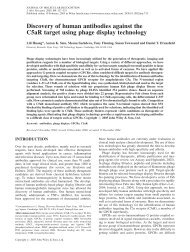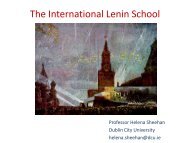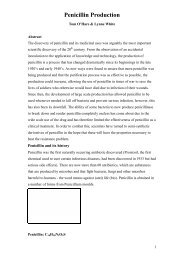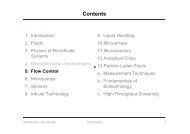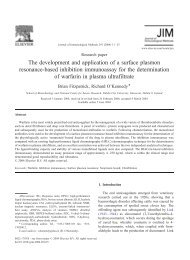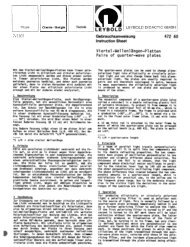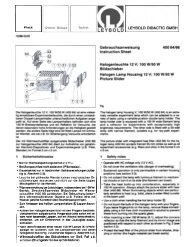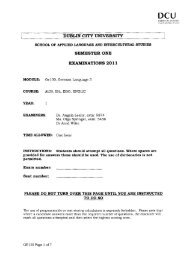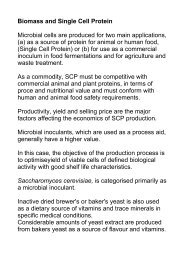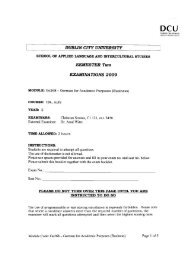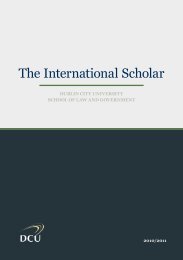download pdf - Dublin City University
download pdf - Dublin City University
download pdf - Dublin City University
You also want an ePaper? Increase the reach of your titles
YUMPU automatically turns print PDFs into web optimized ePapers that Google loves.
A Trip down memory lane<br />
Staff and pupils, present and past, reminice about DCU over the last 25 years. David O’Callaghan,<br />
DCU photographer, adds his photographic memories of past times.<br />
Unique Claims and Holy Hour Drinks<br />
- Michael Patton,<br />
Diageo Group Corporate Relations Director<br />
I have a unique claim of being<br />
the first student to formally register in<br />
NIHE <strong>Dublin</strong> in October 1980. Taking<br />
the 17A from Coolock (that great<br />
social leveller – bringing students<br />
from across the Northside’s social<br />
spectrum – Howth, Raheny, Coolock,<br />
Kilbarrack), it arrived late on the first<br />
day. Dr Danny O’Hare was fully<br />
launched into his welcome speech<br />
when I arrived – the entrance to the<br />
only lecture theatre was beside the<br />
podium – so I decided to go straight<br />
to registration. Hence Michael Patten<br />
became the first name to register –<br />
last but first. Biblical justice. Blame<br />
CIE.<br />
My memories of the nascent<br />
NIHE <strong>Dublin</strong> in its formative years are<br />
vivid and positive. We were a very<br />
small community then, crammed into<br />
the Albert College building as the<br />
foundations of what is now the great<br />
DCU were laid down. It meant that we<br />
had a real opportunity to in some<br />
ways shape the future of the college –<br />
the foundation of the Students Union,<br />
the formation of the Debating Society.<br />
(Our early days in the hustings with<br />
Mark Mortell, David Cousins, George<br />
Hegarty et al were a howl) I even had<br />
the temerity to form a Fianna Fail<br />
cumann in the college which actually<br />
drew a membership. Mortell looked<br />
on in disgust! It was a time when even<br />
course accreditation was still being<br />
finalised – I started a four year BSc in<br />
Communications which ended up as<br />
a three year BA! No matter, it meant<br />
we got to emigrate earlier.<br />
We also engaged in customary<br />
student protest – Minister Martin<br />
O’Donoghue’s visit to officially open<br />
the Grattan building in 1981 was<br />
greeted by a welcome wall of wailing<br />
students (can’t remember why we<br />
protested but it was great fun). I<br />
subsequently invited Gerry Collins to<br />
address a public meeting on nuclear<br />
disarmament. After a very posh<br />
dinner with Dr Danny O’Hare he was<br />
greeted by a hall full of heckling and<br />
Professor Chris Curran, Director of Oscail pictured with<br />
Bertie Ahern, TD and Dr Danny O’Hare.<br />
caterwauling students who manfully<br />
counter argued every point he made<br />
just for the hell of it. He beat a<br />
hasty retreat after giving me a bit of<br />
a roasting.<br />
We enjoyed great and colourful<br />
lecturers. Political Economy of the<br />
Media attracted Nuala O’Faolain, Nell<br />
McCafferty and Michael D Higgins<br />
into the classroom where they argued<br />
the case for the left, women’s<br />
liberation, the oppressed and the<br />
righteousness of the media with great<br />
passion. Those of us who detected<br />
more than a degree of<br />
commercial nous in the stance of<br />
many media on big issues argued<br />
back equally passionately but to no<br />
avail. The Popular Front for the<br />
Liberation and Equality of Absolutely<br />
Everything were not for turning!<br />
Good times, hard work, great<br />
fun. Our problem solving skills were<br />
well honed. To get a drink when the<br />
Slipper closed for holy hour you<br />
(ahem) drove to the Boot Inn outside<br />
the city boundary. Problem solved. No<br />
wonder we became such brilliant<br />
managers and strategists.<br />
Happy Birthday DCU – you’re<br />
making me feel old!<br />
8 DCUTIMES<br />
Years a’growing<br />
– Pat Barker<br />
On 9 September 1980, I arrived in my best<br />
chartered accountant’s suit reporting for duty as a lecturer<br />
at NIHE <strong>Dublin</strong>. I found a building site, with teams of<br />
craftsmen gutting the Albert College and An Grianan.<br />
The Business School consisted of Anthony Walsh,<br />
Donal Keating and myself – Tony Foley joined us one<br />
week later. We were housed in<br />
portakabins on the lawn and we used piles of books<br />
intended for the library as chairs and desks. We had one<br />
field telephone, borrowed from the army, and we all<br />
shared one portaloo that had barely enough space to sit<br />
down and close the door.<br />
Our first weeks were a frenetic whirl of putting<br />
together syllabi for the degrees in Accounting and Finance<br />
and Business Studies. I personally wrote syllabi and drew<br />
up booklists for subjects as varied as Financial<br />
Accounting, Law, Management, Human Resources,<br />
Taxation and International Business.<br />
The four of us defended a panel visit from the<br />
NCEA and spoke confidently and authoritatively about<br />
material that we had only just read about, assuring the<br />
panel brazenly that we were fully competent to teach it<br />
and, anyway, would have specialist lecturers on board<br />
within a matter of months.<br />
After two weeks crouching on the pile of books, I<br />
was moved into An Grianan and Donal and Anthony<br />
moved into the Bea Orpen in a little corner of the library. I<br />
was promised a palatial office in An Grianan. This turned<br />
out to be true; at least insofar as the floor space was<br />
Charlie Haughey under siege at the launch of the<br />
Pilot Plant, 8 June 1987<br />
DCUTIMES<br />
concerned. What David Barry failed to mention was that<br />
moving me in was a legal ploy to break the squatters’<br />
rights of the band of junkies who slept on their mattresses<br />
downstairs and hung up their washing and scattered their<br />
needles and works all over the lavatory.<br />
Getting from An Grianan to the portaloo or over to<br />
the Albert College where we had our lectures and our<br />
lunch, involved clambering over a muddy path and<br />
through the middle of a holly bush with a tiny hole hacked<br />
out of the lower branches.<br />
As the numbers of students climbed towards the<br />
critical number of 15 that we needed to run the<br />
programmes, we prayed when the phone rang and yelled<br />
in celebration with each acceptance and rent our<br />
garments with each withdrawal.<br />
Finally, on November 11, we welcomed our first<br />
students and began the great adventure that has<br />
been DCU.<br />
Deirdre McCartin, giving a video workshop to a<br />
Communications Studies class<br />
Professor Eugene Kennedy with Professor ETS Walton,<br />
winner of the Nobel Prize for Physics in 1951 and<br />
Professor Klaus von Klitzing, winner of the Nobel Prize<br />
for Physics in 1985.<br />
9
Front row: Celine Jameson, Emer Pyne, Jo Bow, Carmel Ryan, Marion Jordan, Nuala O’Faolain, (-), Jane Horgan,<br />
Jo Doyle, Maeve McCarthy, Eimear Irwan, Paula Fox, Pat Barker, (-), (-).<br />
Middle row:David Barry, Paddy Ennis, Frank Soughley, Jim Culliton, Maeve Houlan, Charles McCorkell, Tony<br />
Foley, Daniel O’Hare, Donal Clarke, Thecla Cogan, (-), Anne Higgins, Claire Balfe, Noelette Cross, (-), Marion<br />
Shortt, Sean Marlow, (-)<br />
Back row:Gerry Galvin, Michael Ryan, Anthony Glynn, Owen Ward, Tim Wheeler, Micheal MacConmara, Albert<br />
Pratt, John Graham, Tom Devitt, Eugene Kennedy, Ray Flood, Reggie Hannon, Sandy Spowart, Brian Nettlefold,<br />
Richard O’Kennedy, Mike Aughey, Donal Keating, Martin Henry, Mike Hickey, Tom Fingleton, Tony Coulson,<br />
Anthony Walsh, John Pratschke, Barry Kehoe, Michael Shields, Martin Croghan, Susan Folan, Mike Hooper<br />
First Governing Body of the then NIHE, <strong>Dublin</strong>.<br />
10 DCUTIMES<br />
DCU: The Movie,<br />
by Martin Clynes<br />
Boys oh boys, there were<br />
tough times back then. We lost many<br />
students and staff to cold, hunger and<br />
disease in the harsh and snowy<br />
winter of 1981/82 (well actually one<br />
student skidded on her bicycle and<br />
grazed her knee slightly, and the<br />
Registrar got a bad cold, but that<br />
doesn’t read as well). To stay warm,<br />
we huddled together in the<br />
Scriptorium (there was no library<br />
then) around the single oil lamp.<br />
The Holy Door, leading to the<br />
sacred parts of the institute was<br />
almost always locked except on the<br />
occasion of one of the Master’s<br />
Affairs. Then, the palace would be<br />
brightly lit and we watched from the<br />
shadows as Lord and Lady Ballymun<br />
arrived in their carriage, and were<br />
joined at the Ball by the great and the<br />
good from town and county.<br />
In 1982 came the Hamstead<br />
building, Ireland’s and possibly the<br />
world’s largest two-storey<br />
pre-fabricated building, built to last<br />
five years, used for 19. True story:<br />
Walking past a builder calls from the<br />
roof: “Any idea who has the plans for<br />
this building?” “Ní fios, ask the<br />
foreman,” came the reply. “I am the<br />
foreman.” It wouldn’t happen today<br />
Martin O’Donoghue, at the official opening of DCU 1981<br />
DCUTIMES<br />
now that DCU<br />
has its very own<br />
Estates Office.<br />
In the<br />
1980s there<br />
were meetings<br />
of Heads every<br />
week. Terrible,<br />
interminable<br />
meetings, made<br />
sufferable only<br />
by the benign<br />
presence and<br />
exquisite minute-taking of Susan the<br />
Serene.<br />
Then one day, Young Lord<br />
Ballymun went abroad, on the Grand<br />
Tour with Lord Charlemont. The<br />
peasants revolted. Ynot Nnylg, a<br />
visiting North Vietnamese scholar,<br />
took the Chair. It was Paris 1789. It<br />
was Prague 1967. It was Rome 1848.<br />
No pasarán! Unanimous decision –<br />
Heads’ meetings were to be monthly.<br />
Lord Ballymun returned. It was<br />
Prague 1968. Pius IX returns to<br />
Rome 1849. Guernica. Next meeting:<br />
unanimous decision – Heads’<br />
meetings were to be weekly; Ynot<br />
Nnylg banished to a distant part<br />
of campus.<br />
During the all-too-brief<br />
Regency of Good Prince Albert, there<br />
was a short flirtation with Heads’ and<br />
Professors’ meetings. This was a<br />
brave experiment to see if this larger<br />
group could take even fewer<br />
The Library Issue Desk in the Henry Grattan Building.<br />
decisions than the almost none taken<br />
by the Heads’ meetings – a<br />
Leibnitzian challenge relating to limits<br />
and infinitely small numbers.<br />
Unfortunately, the experiment<br />
had to be abandoned prematurely<br />
due to unruly behaviour by certain<br />
professors, and now again only<br />
Heads meet.<br />
Seriously, though, DCU/NIHED<br />
has been a great place to be. With<br />
very few exceptions, the people in all<br />
sections, schools and units are<br />
unfailingly pleasant, hard-working<br />
and helpful. It has been a privilege<br />
and a pleasure to work with them.<br />
Some have retired, but thank<br />
God most are still alive. Some have<br />
passed on to a different dimension -<br />
Joe Fryar, Anne D’Art and Deirdre<br />
O’Connor. (The Architect who<br />
designed the building where NCTCC<br />
is located) come to mind. They are<br />
still missed.<br />
OK children. Time for bed.<br />
What’s that? I didn’t tell any of the<br />
really good stories tonight?<br />
Biotechnology, Lord Ballymun and the<br />
Black Spot? The Sheriff of<br />
Rottingham rides in? The Modular<br />
Wars? The Eerie Incident of the<br />
Non-Appearing Tea-Elves?<br />
Snow-White and the Seven Deans?<br />
Henry Ford, colour choice and public<br />
debate on biotechnology in 21st<br />
century Ireland? Mister, there’s a<br />
Sea-Jay in your Pilot Plant?<br />
Yes, my dears, they are indeed<br />
better stories, but the mortgage must<br />
be paid. Publication will have to await<br />
the post-retirement memoirs.<br />
11
In memory of Frank Clark<br />
22 February 1956 – 3 April 2005<br />
Francis J Clarke, no matter who you said his name to<br />
and no matter how you said it, you always got the same<br />
reaction. His name always raised a smile on peoples’ faces.<br />
Frank always had that effect on people, he was the life and<br />
soul of any situation. He brought a light to all our lives.<br />
Everyone seems to have known Frank, even if you only met<br />
him once you would have remembered him. He always made<br />
an impression.<br />
In the packed church at his funeral, when I looked<br />
around at so many people, it was hard to believe that one<br />
person could affect so many. There was a good chance too,<br />
that if you had time to go around and talk to everyone, that<br />
they would all have their own particular Frank Clarke<br />
moment. In fact, they would have well more than one.<br />
With me, my Frank Clarke moments were regular. He<br />
was always pulling a gag of some sort or another. My first<br />
moment was twenty-one years ago. I was renting in Clontarf<br />
at the time and Frank invited me up to dinner in a house that<br />
he had just moved into with Gerry Cleary and an accountant<br />
fellow who had very quickly been nicknamed ‘Sad Sack’ by<br />
Frank.<br />
I went up for dinner, I was wined and dined and the<br />
lads told me that this was an every day occurrence and that,<br />
by the way, there was a spare bedroom if I was interested.<br />
DCU 1983-1986<br />
Padraig McKeon<br />
Managing Director Drury Communications<br />
The most regular comment<br />
about DCU made to graduates from<br />
the 1980’s is: “You must see a huge<br />
difference compared to your day.” In<br />
truth you can’t compare. NIHE <strong>Dublin</strong>,<br />
as it was then, had fewer students<br />
and less buildings when I arrived<br />
there in 1983 than the school I’d just<br />
left.<br />
This place always wanted to be<br />
differerent from ofther colleges. In the<br />
mid-1980s it had no difficulty doing<br />
so. Aside from having strange(!)<br />
courses like Biotechnology, Analytical<br />
Science and Communications<br />
Studies, It was also a college with<br />
limited social or sporting facilities and<br />
no heritage, not that that stopped us.<br />
For most people it was serious<br />
class and lab work. For the<br />
Communications Studies heads like<br />
me, that meant onerous tasks like<br />
endless hours in the library with<br />
headphones watching back episodes<br />
Obviously, I jumped at it, I like my food. Not only was<br />
the dining experience not repeated, but I soon became the:<br />
“gullible wee lad from Wexford who thought he’d landed on<br />
his feet.”<br />
We had many parties in that house in Ballygall Road,<br />
and Frank was always the one who would pull out the guitar<br />
and sing a string of songs and tell risqué jokes. Of course<br />
Frank didn’t need a party to tell a few jokes and who was<br />
present was irrelevant, as Father John will<br />
testify, nothing was sacrosanct.<br />
I used to spend a lot of time with Frank, coffee breaks,<br />
lunchtime, working and socialising. He was the kind of guy<br />
that you could feel comfortable with, without having to work<br />
at it.<br />
He’d have you doing things and you always wanted to<br />
oblige because you knew he would do the same for you. He<br />
had me doing banners, posters and signs for the Caravan<br />
Club outings. He had me giving photography classes at the<br />
rallies if they were close to Wexford where I’m from.<br />
Frank would reciprocate. Whenever I needed help,<br />
Frank would be there. It was the same with his students. If<br />
they were in trouble, he would always oblige. I<br />
remember, on occasions, when he even met<br />
students at weekends to help them out if they were stuck or<br />
in a rut.<br />
If Frank saw that you were making a genuine effort he<br />
would be there to give his full support. However, if you<br />
messed him around he took no prisoners. I’m sure if I were to<br />
ask for a show of hands, there would be few reading this who<br />
wouldn’t fit into one of those two categories.<br />
In the Henry Grattan, there’s now an office on the first<br />
floor with a vacant chair, there’s a space in the<br />
restaurant, there’s a void in the studios. Frank’s departure<br />
has been a terrible loss to us all; he was a dear friend and<br />
treasured colleague to all of us.<br />
However, if there is anything positive that can be said,<br />
it’s that our lives are an awful lot richer for having known<br />
Frank. He has left us with memories to cherish, memories of<br />
how he enriched our lives. We’ll all have fond memories of<br />
our Frank Clarke moments, moments which many of us were<br />
lucky to have over and over again, moments which have<br />
affected our lives forever. Frank will always be with us.<br />
of The Riordans or Bracken in the<br />
interests of ‘research’, and that’s<br />
before you mention the photo and<br />
video shoots and event running a<br />
radio station!<br />
People of course made the<br />
day, as they always do, and by virtue<br />
of its size, you were only one mad<br />
haircut or one mad outfit away from<br />
college-wide notoriety. Few of my<br />
lasting memories though relate to the<br />
academic side. Instead for me it was<br />
sport (the 8am training sessions were<br />
the only time in the week that I was on<br />
time), hours in the canteen talking<br />
complete rubbish about<br />
nothing and almost as many hours in<br />
12 DCUTIMES<br />
The Slipper avoiding the locals.<br />
Of course there’s a huge difference<br />
today but that means somebody is doing<br />
something right, and besides if it were still<br />
the same... the likes of me couldn’t say...<br />
“ah but in my day...!”<br />
Congrats to those who have made<br />
that remote comer of Glasnevin into what<br />
DCU is today and congrats in<br />
particular to those who have been there<br />
right through.<br />
Thanks for the memories<br />
– Clare Balfe<br />
As DCU celebrates its first 25 years, I would like to<br />
remember one staff member who sadly died prematurely<br />
in 1993 – Maeve McCarthy.<br />
During the early years it was quite feasible to<br />
become acquainted with everyone on the 60-strong staff<br />
at DCU. There were social activities organised by an<br />
extremely energetic Staff Sports & Social Committee,<br />
characterised inevitably by Maeve McCarthy.<br />
She worked as School Secretary in the School of<br />
Communication Studies and then moved to the Faculty of<br />
Computing and Mathematical Sciences as Faculty<br />
Administrative Assistant.<br />
Maeve, ably assisted by Paula Fox and Pamela<br />
Galvin, inspired and organised the Carols by Candlelight<br />
Paddy Ennis, Joe Cunningham, Jarleth Lavelle and<br />
Larry Doyle<br />
DCUTIMES<br />
Dr Daniel O’Hare<br />
pictured here with<br />
Pat Kenny at the<br />
official launch of<br />
NIHE, <strong>Dublin</strong>.<br />
event for staff and students each Christmas, with funds<br />
going to the St Vincent de Paul Society. At the first such<br />
event, she had to get the mulled wine and mince pies<br />
served up in advance to help improve the singing.<br />
In the early 1980s, when gender equality was in its<br />
infancy, the notion of a crèche in NIHED was not initially<br />
embraced by the authorities. Maeve, who did not require<br />
a crèche herself, and others raised the considerable<br />
amount required to commence the project. The university<br />
authorities then agreed to provide it and Maeve became<br />
an active member of the Crèche Committee.<br />
Maeve also broke the glass ceiling – well, sort of<br />
anyway – by becoming the first school secretary to be<br />
promoted to the position of Faculty<br />
Administrative Assistant.<br />
What I remember most is Maeve’s enthusiasm<br />
(especially for the talent competition), joie de vivre,<br />
generosity, determination and her optimism. Her superb<br />
qualities put her in a class of her own and were only<br />
matched by her ability to get on with everyone who met<br />
her. Indeed she was well liked and loved by all those who<br />
got to know her during the years 1980-1993.<br />
Following her death, her son Daragh donated a<br />
bench to DCU in her memory. Maeve’s Bench stands next<br />
to the School of Computing.<br />
In January 2003, Daragh invited Maeve’s relatives,<br />
friends, neighbours and her DCU colleagues to a<br />
champagne reception at the Herbert Park Hotel to<br />
remember her on her 10th anniversary. It was a great<br />
gathering of friends and one that Maeve would have<br />
reveled in herself – a fitting tribute to a remarkable and<br />
unique woman.<br />
Graduation ceremony in the main Sports Hall, 1994<br />
13
Chaplaincy reflections<br />
– John Gilligan<br />
I still remember the day I arrived in DCU: 17 June 1991. I<br />
had come from Arklow Community College where I had been<br />
teaching since 1985 and had just completed a postgraduate in<br />
Chaplaincy Studies at Mater Dei.<br />
I received a great welcome from Fr Pat McManus whom I<br />
was replacing. He was the first Chaplain to NIHE/DCU. Coming<br />
from a school of 400 students, with a very definite structure of 32<br />
classes a week, to a university of 2,000 students with no<br />
structure was a real shock.<br />
However I battled on and to this day love the work I try to<br />
do. I was very fortunate to walk into the Inter Faith Centre which<br />
had opened the previous year. There were a team of five of us –<br />
two full-time and three part-time.<br />
My first big involvement with students was the BITE<br />
project – getting students from DCU to give tuition in the<br />
Ballymun Comprehensive Schools on Wednesday<br />
afternoons. I remember getting over 100 students<br />
volunteering to give tuition. At last I felt I was getting to know<br />
some students. This has been a great link between the school<br />
and community and it is still going strong today.<br />
I also remember getting involved in sport – training with<br />
25 years at DCU<br />
- Professor Malcolm Smyth,<br />
Dean of the Faculty of Science and Health<br />
I shall never forget arriving at the Albert College for<br />
my interview for the post of Lecturer in Analytical<br />
Chemistry back in 1981. The taxi had taken me to<br />
somewhere near UCD the night before, and I had had to<br />
take a taxi back across the river to find this new institution<br />
called NIHE <strong>Dublin</strong>. I was suffering from the flu and a<br />
stinking cold, and was still caught up in thoughts about my<br />
wedding in London a few days hence. I remember<br />
meeting another candidate for the job, who was certain he<br />
had been successful; I left <strong>Dublin</strong> that day not expecting<br />
Albert Pratt (as Head of the fledgling School of Chemical<br />
Sciences) to get a message to my bride-to-be the day<br />
before we were to be married, that they wanted to offer me<br />
the position.<br />
As fate would have it, I came, and haven’t looked<br />
back. Not that I ever felt I would ever settle in the other part<br />
of the island in which I had been born and raised. I had<br />
spent the last five years travelling the world as a<br />
postdoctoral fellow, with posts in the USA and Europe;<br />
now I was at the start of new adventures in my personal<br />
and professional lives. I am writing this short piece from<br />
what were green fields back then, where I played football<br />
with the likes of Robert Lawson (School of Biotechnology),<br />
Kieran Molloy (now at <strong>University</strong> of Bath) and Frank<br />
Mulligan (now at NUI Maynooth). People make<br />
the Gaelic Football Team, playing lots of squash, indoor soccer<br />
and going on student golf outings. We had many a good<br />
weekend playing golf all over the country. Going away with various<br />
student societies was lots of fun.<br />
In the early 1990s, the social scene among the staff was<br />
great. Every Friday at 5.30pm staff from all parts of the<br />
university would meet for a pint or two in the DCU bar – more<br />
times than not we were still there at closing time.<br />
We had staff quizzes and Christmas functions in the bar<br />
as well as weekends away. I always remember the St Patrick’s<br />
weekend of 1992. Over 45 staff hired seven cottages in<br />
Muckross in Killarney – what a weekend! And the number of<br />
romances that cameout of it…<br />
As a Chaplain, I have had the great privilege of<br />
getting to know many staff and students over the years. I<br />
celebrated some very happy occasions (over 150<br />
weddings) and have also experienced some<br />
terrible tragedies.<br />
As I begin my fifteenth and unfortunately my final year in<br />
DCU, I wish to thank all the former and current staff and students<br />
for all the great memories.<br />
A special word of thanks to all my colleagues in Student<br />
Affairs, the chaplains I work and have worked with and to the<br />
student unions over the years. It has been a great journey and all<br />
the best for the next 25.<br />
organisations. I can clearly attest that the early success of<br />
DCU was built on the fact that we (staff and students alike)<br />
knew each other, eat and drank together, forged<br />
friendships, put-it-up to each other in terms of<br />
goals/achievements. I have always been challenged at<br />
DCU, and I believe that this is what makes all of us strive<br />
to even greater achievements. This is clearly manifest in<br />
the recent success of NCSR in the SFI-funded CSET<br />
scheme to set up the Biomedical Diagnostics Institute<br />
(BDI) at DCU. Sensor research started here at DCU back<br />
in the mid-1980s. It started small (we had the NBST to give<br />
us a few thousand pounds for research projects in those<br />
days), but people have stayed together, challenging<br />
themselves and each other, and challenging the world to<br />
gain its respect.<br />
We have done that, but the world does not stand<br />
still, and we are all as good, at least in the scientific sense,<br />
as our last publication. Tony Bradley’s Twigs for an Eagles<br />
nest captures so much of what DCU was in the early days<br />
– Tony is someone I could always share things with, and<br />
hope he is well as I write; Margaret Walsh (former Director<br />
of HR) is another (the picture of the frog trying<br />
desperately not to be swallowed by the heron under the<br />
caption Never Give Up comes to mind. I care not to<br />
recount the many battles, other than to say that I won<br />
some, I lost some, I was right about some things and<br />
wrong about some others. I will never regret, however, my<br />
coming to this great university. I cannot thank or mention<br />
everyone. It is still a pleasure for me to greet Paddy Ennis<br />
or other members of support staff, as it is to talk to my<br />
academic colleagues. As I said above – people<br />
make organisations.<br />
14 DCUTIMES<br />
Campus parties<br />
– Professor Michael Ryan,<br />
School of Computing<br />
Picture the scene back in the<br />
days when we had no bar on campus.<br />
We organised occasional parties in the<br />
computing laboratories, bringing in<br />
refreshments (thanks to a colleague<br />
who had worked in Guinness, we had<br />
an inside track on some of these).<br />
The last lecture in final year of<br />
the BSc was traditionally marked in this<br />
way, listening to music, and watching<br />
incriminating photographs of staff being<br />
taken under the NO EATING, NO<br />
SMOKING, NO DRINKING notices.<br />
One year some students<br />
continued singing while leaving the<br />
Professor Eugene Kennedy and Bertie Ahern, TD on the<br />
occasion of the opening the Physics building 1984<br />
Early days at the School of Biological Sciences, Richard O’Kennedy<br />
When I started in October, 1980, the start of term<br />
had already been put back due to lack of labs,<br />
lecture rooms, equipment and staff. There were no<br />
catering facilities and lunch meant a trip down to what is<br />
now Enterprise Ireland (then the Old Institute for Research<br />
and Standards).<br />
There was no NIHE telephone line and telephone<br />
calls were made on a pirated line or by standing in a<br />
queue outside the phone booth just beside the Slipper<br />
pub. There were no computers, one copier, and no forms<br />
to be filled in…they came later.<br />
When we needed equipment I went down to the<br />
local suppliers andliterally filled the car and gave them a<br />
list of what I had taken. There was a wonderful<br />
comradeship and sense of adventure and in the<br />
bleakness of the times it was so refreshing to go to a<br />
new place.<br />
DCUTIMES<br />
building, despite the fact that (a) they<br />
encountered the President and (b) he<br />
figured in their song. A name was taken<br />
by Security, and passed on to me.<br />
The student was very worried at<br />
having: “insulted the Big Man,” and so<br />
willing to see the President next<br />
morning and apologise. He informed<br />
me that the President had been very<br />
nice and understanding and basically<br />
had laughed at him. He was relieved.<br />
So was I.<br />
Over the next year, DCU<br />
developed further and new regulations<br />
were put in place. On-campus festivities<br />
were not being encouraged. So that<br />
year’s party was moved to a room on<br />
the ground floor at the furthest<br />
extremity of the buildings.<br />
That evening the President and<br />
the Chairman of the Governing Body<br />
were in the President’s office, deep in<br />
serious discussion, when they were<br />
disturbed by an unusual noise…the<br />
characteristic rumble of beer barrels<br />
being rolled and a few bars of the song,<br />
Roll out the Barrel.<br />
Instead of dropping the kegs off<br />
quietly outside the party room, the BSc<br />
students had rolled them down the<br />
avenue from the Ballymun Road, then<br />
directly below the windows of the<br />
President’s office, and across the<br />
campus, singing all the while. It was an<br />
approach to beer delivery that I, for one,<br />
certainly had not thought of.<br />
The beer of course was spoiled<br />
but the party went off well. The resulting<br />
exchange of memos between the<br />
School and the President was however<br />
very interesting.<br />
Potential CTYI students attending a workshop during an<br />
open day,1993<br />
In many ways the secret of the success that was to<br />
be ours came from a sense that anything could be<br />
achieved. No matter what effort was required, it was all<br />
shoulders to the wheel.<br />
The students eventually arrived and were fabulous.<br />
They and their parents were willing to trust us with their<br />
futures and the hard earned cash then necessary for fees.<br />
When I see the facilities and level demanded from today’s<br />
students I cringe.<br />
There were no facilities. Frequently there was no<br />
water or electricity and despite these problems we ran<br />
practicals. To get equipment I borrowed from friends in<br />
other institutions who were marvelous but I could only use<br />
the equipment for one afternoon and then drive it back<br />
across <strong>Dublin</strong>. It is interesting that at that time I could go<br />
home to lunch on the Southside and be back all within an<br />
hour…how things have changed.<br />
15
NIHE Postgraduate<br />
Diploma in Journalism<br />
1982 – 1983,<br />
Eithne Hand<br />
September 1982 and the first<br />
year of the first Irish postgraduate<br />
course in Journalism began in NIHE<br />
<strong>Dublin</strong> – a place most people had<br />
never heard of somewhere in<br />
Ballymun but called Glasnevin.<br />
Around 20 of us gathered – the<br />
picture shows 18 but there was never<br />
a day that some us weren’t in so I’m<br />
hazarding 20 – a motley bunch with a<br />
sophisticated fashion sense and not a<br />
little amount of attitude.<br />
Everything was physically<br />
completely different in terms of the<br />
college - unrecognisable now in terms<br />
of buildings and facilities. We were to<br />
be part of Communications but not<br />
really – our postgraduate status set<br />
us apart and became the strongest<br />
element of any cohesion between the<br />
group. There certainly was some<br />
resentment if we were ever treated<br />
like first years – we all felt that we had<br />
been there and done that.<br />
I imagine we were quite tricky<br />
for the lecturers to get a handle on.<br />
Our law lecturer left by Christmas and<br />
we revolted against our radio<br />
Eithne Hand pictured here with the<br />
Journalism class of 1984<br />
assignment which asked us to record<br />
a programme with Travellers because<br />
we believed it was wrong to use<br />
people as guinea pigs for a mere<br />
student exercise. My memory is that<br />
we won that one.<br />
We had some fantastic courses<br />
the most memorable being Luke<br />
Gibbons History of the Press, with his<br />
colourfully clashing regalia and great<br />
command of language. Overall there<br />
was a sense of the course that it was<br />
good but it was going to be better.<br />
One incident still stays: a guest<br />
lecture given by one of the foremost<br />
female reporters/ broadcasters of the<br />
time. To spare her blushes I won’t<br />
name her. She came, she talked and<br />
she impressed. We sat and listened<br />
and interacted and a good impression<br />
was made.<br />
Later that day she returned to<br />
her newsroom and, not realising that<br />
one of our class double jobbed as a<br />
stringer for her paper, she launched<br />
into a parody of: “...the little darlings<br />
with daddies’ money paying for their<br />
expensive course, sitting there up in<br />
DCU with their neat little newspapers<br />
on their desks etc etc…”<br />
In fact her newspaper had sent<br />
free copies to class members that<br />
day. When this came back to us it was<br />
a timely and early lesson in never<br />
opening your mouth without knowing<br />
your audience. And yes the course<br />
was very expensive and no we didn’t<br />
all have rich fathers.<br />
Looking back I think the main<br />
asset for all of us was that the course<br />
was new and one of a kind. That<br />
certainly opened doors as there was<br />
an expectant bunch of people in<br />
newspapers and broadcast<br />
organisations looking for more than<br />
the raw recruit.<br />
Certainly, from an RTE<br />
perspective, within the next few years<br />
Bernie Brennan, Helen Shaw, Eileen<br />
Magnier, Derek Cunningham,<br />
Kathleen O’ Meara and myself all<br />
ended up working there. Kevin<br />
O’Sullivan and Mark Brennock were<br />
also heard on the air.<br />
We don’t all keep in touch. We<br />
boycotted the graduation I think and<br />
certainly didn’t ever have any major<br />
reunions but there’s still a certain<br />
connection there when you look at<br />
this picture and see us all back there<br />
trying to find our way.<br />
I don’t think there was any<br />
special talent being handed out at the<br />
door that year but there was just a<br />
sense of right place, right time. Now<br />
in 2005 when I see the quality of the<br />
standard of students coming into RTE<br />
Radio from that course I am often<br />
gob-smacked and it makes me feel<br />
proud somewhere deep down.<br />
Fantastic years from<br />
Joseph Boyle,<br />
BS graduate 1994.<br />
There are so many great<br />
memories of DCU - inevitable, after<br />
four years of study: outstanding<br />
lectures, great ENTS events, the new<br />
Business School, the new student<br />
building, sharp discussion at union<br />
and academic councils, equally keen<br />
chat over a beer after hiking Ben<br />
Nevis, project completion and of<br />
course, graduation. I hope the<br />
students of tomorrow enjoy their time<br />
as much as I did.<br />
16 DCUTIMES


